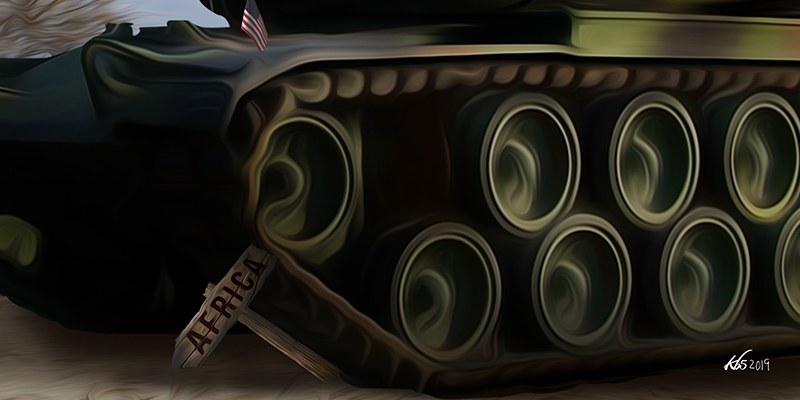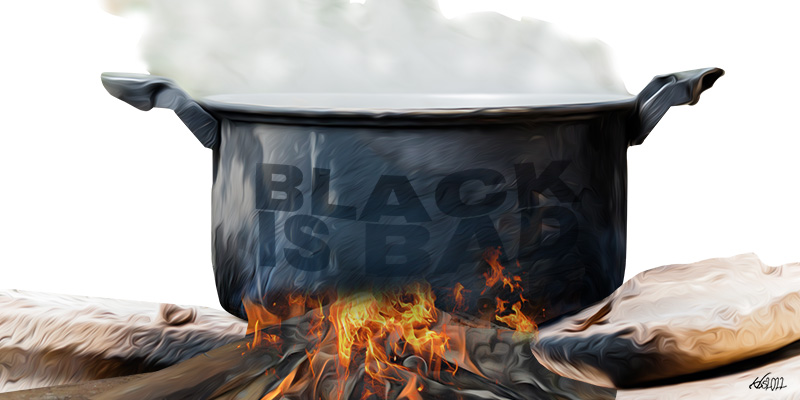America’s Forever War On Terror is undermining democracy, good governance and economic development throughout the Greater Horn of Africa as well as elsewhere in East Africa. The Trump Administration’s new “Prosper Africa” strategy is not expected to alter this bleak assessment as US security objectives in the region remain unchanged and the newest opponent, China, broadly supports campaigns to fight terrorism.
America’s Forever War On Terror is undermining democracy, good governance and economic development throughout the Greater Horn of Africa as well as elsewhere in East Africa
In fact China’s well-known refusal to interfere in the internal political and social affairs of African states seems to have made it the preferred business partner of the political classes in Kenya and Uganda. Similarly, since 2008, America and its Western allies have increasingly emphasised peace and stability within the region with initiatives promoting democracy, human rights and good governance receiving much less sustained support. Countering China’s growing economic hegemony will inevitably cause the US to de facto accept corrupt practices and authoritarian governance, especially in those nations considered vital to prosecuting its War Global War On Terror.
The United States has made fighting terrorism the new litmus test for nations seeking good relations. The overarching priority to defend the homeland ultimately colors everything America does regardless of what America says. Since 9/11 “Jihadist Terrorism” has been elevated globally to the same threat level previously accorded to Communism prior to the fall of the Berlin Wall in 1989. The establishment of Africom, a separate Pentagon entity specifically tasked with promoting US security interests in “Black” Africa, has seen the growth of a network of American military facilities across the continent. Troop numbers are estimated to be in excess of 7000 permanent personnel with 4,000 deployed to the Horn of Africa.
Although too soon to tell, it is likely that Trump’s shock directives to withdraw all forces from Syria and 7,000 soldiers from Afghanistan will soon be applied to American boots on the ground in and around Africa with uncertain consequences to his new Africa policy and the myriad anti-terror operations being conducted with European and African armed forces across the Sahel.
Over the second half of the 20th Century, US relations with the African continent were informed by the contest between capitalism and communism. Characterised as the Cold War, for more than four decades following the end of the second World War, heavily armed alliances faced off under the nuclear umbrella of mutually assured destruction courtesy of the US and Soviet Russia. This bipolar world was well established by the 1960s when Britain, France, Belgium and Italy granted political independence to their colonies, leaving Portugal – a NATO member- and white ruled Southern Rhodesia engaged in low-level counter insurgencies with indigenous liberation movements. These were often Marxist in orientation and intermittently supported by the newly independent members of the Organization of African Unity (OAU) as well as by Communist China and Cuba. South Africa, independent under white rule since 1910, and its de facto colony of Southwest Africa(now Namibia) became increasingly isolated politically as Apartheid was systematically implemented and entrenched.
China’s well-known refusal to interfere in the internal political and social affairs of African states seems to have made it the preferred business partner of the political classes in Kenya and Uganda.
Africa’s Cold War experience had few redeeming features; existing patterns of economic underdevelopment, social dependency, authoritarianism, impunity, endemic corruption and disrespect for human rights and international legal norms, can be directly attributed to post-independence great power competition. Neither the US nor the Soviet Union had any colonial history or legacies on the continent to either make amends for or to protect. From their perspective, African states after 1960 were pawns in a great game whose center of gravity was elsewhere. Unlike the former colonizers, neither had long-term plans for economic exploitation. Modern roads, rail lines, airports and the like were afterthoughts, designed to gain influence with national elites reflected in UN General Assembly votes and access to militarily vital ports and airfields. As a result, neither bothered with grand strategies to guide operations on the continent, each leaving it to relatively small groups of security-oriented bureaucrats and careerists.
Communist China also carried influence in Africa by supporting revolutionary movements battling white minority regimes in Southern Africa, including building the Tanzania-Zambia Railroad linking the Copperbelt to Dar es Salaam to lessen the dependence of Frontline States on Pretoria. The railway had little economic impact although it garnered much political support for Mainland China in its campaign to supplant Taiwan on the UN Security Council and as rifts grew between Beijing and Moscow.
Though done to support somewhat reactionary national objectives (e.g. to counter the spread of communism across Africa), US activities still reflected a sincere belief that Africans could be rapidly won over to the “American Way of Life” that included free enterprise, competition, labor union organization, participatory democracy and adherence to the rule of law. To that end, America generally employed soft power to win friends and influence national elites; relatively large amounts of money were spent by USAID on programs focusing on agriculture, policing, health, democracy, rural development, enterprise development, civil service management and administration. US-based multinational corporations like General Motors, Firestone, Kodak, Bank of America and IBM, many of which historically operated in southern Africa, were encouraged to expand their presence across the newly independent nations, often in direct competition with colonial-era trading establishments. All manner of cultural exchanges took place and reading rooms and libraries were opened as thousands of Africans were welcomed to study at American institutions of higher learning.
During the first decade after independence, formal military ties were limited to traditional partners Ethiopia and Liberia although access to Mombasa was negotiated for US Navy shipping. Washington generally left military affairs in their respective former colonies to the British, French and Belgians–who all kept significant commercial and financial stakes in their former possessions and maintained varying degrees of political and military relationships – and cooperated with Pretoria in the defense of the strategic trade routes around the Cape of Good Hope between the South Atlantic and Indian Ocean. America studiously avoided mentioning increasing Soviet Bloc involvement in liberation wars to overthrow Portuguese colonial regimes in Angola, Mozambique and Guinea-Bissau and seemed willing to overlook Moscow’s support via Zambia for armed groups gearing up to fight the white minority regime in Rhodesia as well as for desultory ANC activities to promote armed struggle in South Africa.
The Soviet Union, its Warsaw Pact partners and Cuba were generally unable to compete with American soft power-with the notable exception being university scholarships and cultural exchanges heavy on Marxist Leninist ideology. They however exercised hard power whenever opportunities presented themselves. Soviet bloc military equipment and technical advisors were liberally provided to southern African liberation movements, leftwing rebels in the Congo, Tanzania, and Uganda and critically to Somalia after Gen Siad Barre overthrew its civilian government in 1969.
Somalia tragically illustrates the legacy of how a local elite manipulated Cold Warriors to achieve local objectives albeit not always successfully. Hard power from the Soviet bloc was deployed to Somalia on a scale not previously seen in Africa: the Somali National Army was reorganized on Soviet lines and comprehensively reequipped with tanks and armored vehicles and motorized artillery complete with Red Army advisers at all levels of command; the Air Force was gifted modern aircraft. The Stasi, East Germany’s secret police, took over internal security and Cuban experts arrived to provide development assistance, paramilitary training and political indoctrination as well as to handle military assistance that began flowing to Marxist-oriented Eritrean liberation movements. Communism had arrived at the Heart of the Horn of Africa to threaten the interests of the United States and its local allies; nothing has ever really been the same since.
From an American perspective, Africa in the 1970s was fraught with challenges. Portugal withdrew from its colonies leaving behind Marxist governments that permitted their territories to be used by Soviet/Cuban/Chinese supported revolutionaries launching wars of liberation against Zaire’s longstanding western ally Mobutu Sese Seko, South African-occupied Namibia and the white minority regime in Rhodesia. The closure of the Suez Canal in 1973 and the 1979 overthrow of the Shah of Iran meant that the Cape of Good Hope became irreplaceable for the transit of the west’s oil supplies, making stability in South Africa more of a priority than the ending of apartheid. Pretoria cast the victory of Soviet hard power in Somalia and elsewhere in Africa against United States’ seeming to retreat from Asia and the Middle East, to influence conservative opinion in the US, UK and other western states to go slow on implementing anti-apartheid sanctions, acquiesce in the continued occupation of Namibia, maintain significant financial and military links and cooperate on areas of mutual interest, including suppressing communist terrorism at home and abroad.
By 1980 the US began to adopt a more muscular military-oriented approach in its dealings with the political classes in many African states. When America’s long-time friend, Emperor Haile Selassie, was overthrown by Marxist military officers, the Soviet Union switched its support from Somalia to the much more populous Ethiopia and the US magically befriended Siad Barre, “Scientific Socialism”, secret police and all! American military assistance and support flowed to Eritreans fighting the Marxists in Addis Ababa, Mobutu in Zaire as well as to any state actively committed to defeating the global threat of Soviet communism; Soviet hard power was displayed in Angola by the deployment of thousands of Cuban troops to prop up the MPLA regime. Kenya was viewed as a reliable ally of the West mainly because of its stability and relatively developed capitalist economy; little concern was raised as political repression increased, corruption escalated and government functions atrophied and deteriorated. Kenya’s strategic location within a nasty neighborhood and its continued security cooperation with the US and UK allowed its government to influence conservative politicians and business interests to discourage sustained criticism of its domestic politics or backsliding on human rights and economic development. Nevertheless as the Cold War began to wind down in Europe beginning in 1987 and all Soviet troops completed their withdrawal from Afghanistan in February 1989 American policies in much of Africa began to “soften” with emphasis shifting to matters of good governance, economic liberalization, media freedom, democracy and human rights.
Looking back from the vantage point of 2019 it is fair to describe the years 1989/1990 as the time when the US began putting principle before pragmatism; without the perceived existential threat of Communism, Washington was free to push Pretoria to grant independence to Namibia, to stop destabilizing Marxist governments in neighboring states and to open negotiations with the ANC to end apartheid and bring real democracy to South Africa. Within the Greater Horn of Africa, Washington reduced security assistance to the Siad Barre regime in Somalia and began normalizing relations with the Marxists in Addis Ababa, eventually facilitating regime change with self-determination for Eritrea.
The appointment in 1989 of conservative journalist, Smith Hempstone, as US Ambassador in Nairobi put an end, albeit not completely, to the Moi Government’s increasingly repressive and kleptocratic free ride in the final decade of the Cold War. Hempstone had solid Cold War credentials, having served as a Marine Corps officer in Korea, after which he pursued his journalism career in late 1950s early 1960s in East and Central Africa, reporting extensively on trouble spots from Katanga to Zanzibar. He was a lifelong Republican who believed in free enterprise, democracy and American exceptionalism: he eschewed diplomatic niceties and disdained State Department protocols and bureaucracy which he saw as little more than self -serving careerism. His obduracy and willingness to speak truth to power at State House curbed many of the excesses of KANU, midwifed the reintroduction of multiparty politics and increased freedom of expression in Kenya and across East Africa.
The collapse of the Soviet Union also put an end to the many variants of Marxist economics and African Socialism notionally practised by governments throughout Africa. Exchange controls, import licenses, price controls, state monopolies and confiscatory taxation policies were seriously examined and significantly liberalized especially in Kenya during the 1990s; Foreign Direct Investment (FDI) was viewed as a means of sustainably growing national economies with substantial job creation being an intended outcome. Make no mistake: US businesses were expected to benefit from the opening up of the Kenyan market including displacing long established British and other European commercial interests; China was not even considered as a player since Beijing had only abandoned Communism in 1988 and its economy was still mired in overly centralized state controls. The prevailing view of export-led trade as the engine of overall economic development ala the Asian Tigers culminated in the introduction by Washington of the African Growth and Opportunity Act (AGOA) in 2000. Under AGOA qualifying African countries can export into the US duty-free some 6,400 products ranging from textiles to cars and agricultural consumables of all sorts; the program emphasizes value addition and development of value chains thereby creating jobs as well as enhancing the sort of infrastructure needed to produce goods to be shipped to 360 million Americans.
Looking back from the vantage point of 2019 it is fair to describe the years 1989/1990 as the time when the US began putting principle before pragmatism
After Smith Hempstone’s departure in 1993, Kenya and other states in the region continued to attract American aid and investment focused mainly on health, welfare, commerce and human rights. Kenya retained its perceived position as an “island of peace” and order in an increasingly disorderly region: genocide in Rwanda, famine and civil war in South Sudan, warlordism and famine in Somalia all made the country the prime location for humanitarian relief activities on a massive scale. Election related ethnic clashes in 1992/3 and 1997 were dismissed by western agencies as unfortunate byproducts of the new democratic dispensation. American diplomats avoided confrontation with Nairobi’s ruling elite and became noticeably weary of opposition disunity and fractiousness. The first General Election after 9/11 was lauded as a notable victory for democracy as an unusually unified Opposition peacefully removed the former ruling party KANU from power at the end of 2002. The new leaders led by President Mwai Kibaki said all the right things and seemed to be pursuing much needed reforms at least until the wheels started coming off in early 2004 and the new regime fell apart in 2005, amidst power wrangling over the details of a much needed new constitution and the emergence of corruption on a grand scale. By this point in time America’s Global War On Terror had taken center stage in the foreign policy and security establishments not only in Washington but also London, Paris, Berlin and the capitals of other “Western/European” allied nations. Good governance took a back seat to fighting terror. Doing business in Kenya, Uganda and elsewhere around Africa became noticeably more difficult and the global financial crisis of 2008 effectively put an end to the expansion of American business activities. Meanwhile, less than two decades after renouncing Communism in favor of policies encouraging individual accumulation of wealth, China was aggressively pursuing commercial opportunities throughout Africa.
The Global War On Terror had institutionalized a hands off approach to domestic affairs as diplomats asserted respect for sovereignty even as elections were mismanaged, corruption skyrocketed, security forces’ abuses and inefficiency increased and economies tanked. China soon became the major source of funds for infrastructure development and China continues to run huge trade surpluses with Kenya and other countries in the Horn of Africa.
The last two US ambassadors to Kenya illustrate the centrality of the GWOT in US relations with the continent. Outgoing US Ambassador to Kenya, Robert Godec, is a survivor of the 1998 US Embassy bombing and has spent the last twenty years in various State Department assignments concentrating on fighting jihadist terror, especially that of Al Qaeda. His predecessor, Major General Scott Gration USAF (Ret) was at the Pentagon on 9/11 and also developed close personal and professional ties with Kenyan civilian and military figures while growing up in East Africa and on active duty assignments during the last decade of the Cold War.
However, the United States has effectively abandoned any ideas of large scale military interventions on the order of either Afghanistan or Iraq; even the relatively short-lived Operation Restore Hope in 1992 which saw upwards of 20,000 Soldiers and Marines committed to stabilizing Somalia is not in the cards. Nation building as American policy in the Third World has long been out of favour. The United States and its western allies prefer training local proxies to battle against Al Qaeda and ISIS affiliates in Africa, as is the case in Somalia where they arm and support the AU Mission in Somalia (AMISOM) to battle Al Shabaab. The same pattern has been duplicated in Niger, Burkina Faso and Mali; terrorists are killed by drones and manned airstrikes: American troops engage in raids to disrupt terrorist operations notionally while indigenous forces are being prepared to take on the Islamist insurgents.
Much as was the case during the Cold War, national elites have sought to exploit superpower preoccupations. Regime opponents are often branded extremists or terrorists, and domestic conditions that breed disaffection and extremism are seldom, if ever, mentioned. It is no secret that governments across the region have become increasingly intolerant of political dissent and have reduced media freedom even when issues of national security are not involved; the constitutions of Uganda and Burundi, for example, have been amended to remove presidential age and term limits. Yet, criticism by the US and other western nations has been muted since there are no ready sources of replacements were either or both regimes to withdraw their troops from AMISOM.
The rationale of the US led Global War On Terror is to safeguard the American homeland and to prevent a repeat of 9/11 on American soil; apparently our strategy has been deemed effective since neither Al Qaeda nor its even more extreme offshoot and competitor IS has not been able to successfully attack the US. However, is there any sufficient evidence that American antiterrorist activities and its strategy to combat Islamic extremism in the Greater Horn of Africa have contributed in any way to US security?
As an American citizen, who has been immersed in security matters for more than 45 years, I believe our perpetual war on terror as conducted in this region, where I have lived since 1981 is simply undermining all of our efforts to assist emerging democracies to develop systems of good governance, justice, rule of law and respect for human rights that are conducive for significant and sustainable American commercial engagement as envisioned before Cold War exigencies derailed our soft power activities. We are inadvertently facilitating the sort of environment in which China’s long-term initiatives can be successfully implemented and within which China prospers in Africa.








